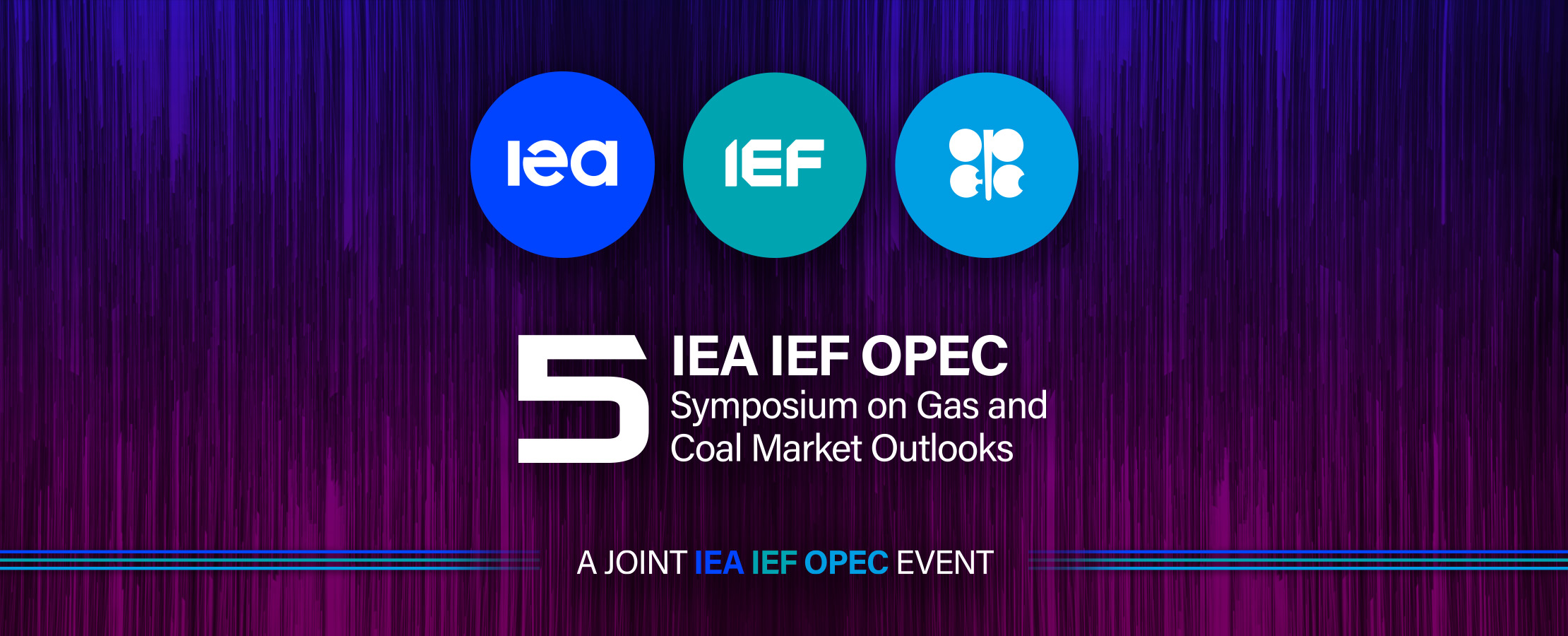5th IEA–IEF–OPEC Symposium on Gas and Coal Market Outlooks
Wednesday 28 April 2021, Livestream Virtual Event
- Europe: 13:00 - 17:30 CET
- Americas: 07:00 - 11:30 EST
- Middle East/Africa 15:00 - 19:30 AST
- Asia 20:00 - 12:30 AST
Background
Natural gas and coal are mainstays of the global energy mix accounting respectively for about 23% and 27% of today's global energy mix. Government policies to support a sustainable, long-term, net zero goals have brought into question the future evolution of these markets. Strong policy support for renewables, hydrogen, the Circular Carbon Economy plus electrification could all affect the future for both these fuels.
Investor sentiment also appears to be changing. Companies and financial institutions are implementing Environmental, Social and Corporate Governance (ESG) investment requirements that would favour investment in clean energy technologies which could in turn have an impact on the flow of investment into new gas and coal projects.
Despite this, most of the growth in demand for energy will take place in emerging and developing economies. While the growth in coal demand in these economies has slowed dramatically in the past two years, the high level of investment activity in natural gas, particularly LNG over the same period, suggests that in these regions, continued growth is expected for this fuel. Nonetheless, developments of clean-energy transitions policies and the availability of finance for coal and natural gas projects could have a major impact on the future growth in demand for both fuels.
This Fifth Symposium on Gas and Coal Market Outlooks examined to what extent demand, supply and investment trends that were already in motion have accelerated during the Covid-19 pandemic and the implications for the future of natural gas and coal. A distinguished line-up of experts offered their diverse perspectives on what these shifting variables mean for clean energy transitions, energy market stability, investment outcomes and government policy. These Symposia are jointly organised by the International Energy Agency (IEA), the International Energy Forum (IEF) and the Organization of the Petroleum Exporting Countries (OPEC) in response to the call from G20 Leaders at the Cannes Summit in November 2011 for continued annual dialogue between producers and consumers on short-, medium- and long-term outlooks and forecasts for oil, gas and coal that builds on the trilateral programme of work IEF Ministers endorsed at the 12th IEF International Energy Forum Ministerial in Cancun in 2010.
The Symposium encouraged participation of all invitees after each set of presentations and was structured into two sessions, the first covering short-term natural gas and coal markets dynamics and recovery from the immediate impacts of Covid-19 and the second, the longer-term policy and market developments that take into consideration the impact of energy transitions required for sustainable and inclusive energy market outcomes.
Discussion Questions
Session 1: Short-Term Developments in Gas and Coal Markets
Due to the global impacts of Covid-19, energy demand fell dramatically in 2020. That said, the widespread rollout of Covid-19 vaccination programmes and mass immunisation campaigns worldwide are bringing hope to not only human health but to the global economy which, is expected to grow by 5% in 2021, according to the latest data from the International Monetary Fund. In the short term, this will mean an increase in demand for coal and natural gas due to a more rapid return of economic activity. However, investment deferrals in the gas and coal sectors, together with a resurgence of new variants of the virus both create uncertainties about how quickly demand will recover.
- To what extent are coal and gas demand, supply, trade and investment all affected by the Covid-19 pandemic? What is the trajectory for coal and gas market recovery in a post-pandemic environment?
- In what way are higher natural gas inventory levels having an impact on LNG trade and investment in LNG infrastructure?
- How are policymakers incorporating coal and gas into post-pandemic recovery plans and what does this mean for long-term demand and sustainable growth?
Session 2: Medium and Long-Term Developments in Gas and Coal Markets
Along with the immediate impact on energy demand and the global economy, the COVID-19 pandemic was also a catalyst in accelerating energy transitions. Demands for consumption of cleaner fuels, net-zero emissions and climate-change mitigation are now stronger than ever before and pandemic recovery stimulus packages have provided governments with the means to address these concerns, albeit at different levels. The pace of acceleration depends primarily on government policies and adoption of technologies that will enable real, sustainable outcomes and achievement of shared goals. At the same time, energy demand in non-OECD Asia is expected to grow in the long term which will keep coal a relevant part of the energy mix, even in as late as 2040. Together with rising ESG demands on investors and the energy industry in the OECD region, both developments will have real and lasting effects on the future of coal and natural gas.
- How can China, India, and Southeast Asia enhance gas-market penetration and overcome market and policy hurdles to achieve a a more sustainable and securer energy system and and securer energy system?
- How are investment trends changing in coal and natural gas industries?
- In what manner will the full impact of Covid-19 accelerate the use of market-, technology- and regulatory mechanisms such as carbon pricing, CCUS and whole system solutions or increase energy efficiency and environmental standards to reach sustainable goals sooner?






